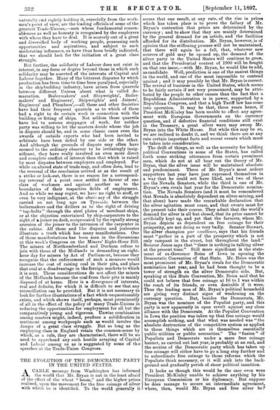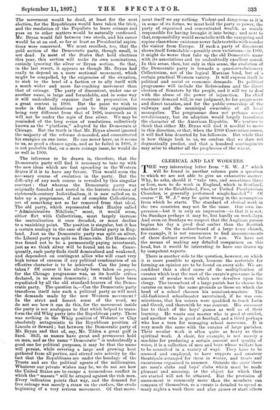THE EVOLUTION OF THE DEMOCRATIC PARTY IN THE UNITED STATES.
ACABLE message from Washington has informed the world that Mr. Bryan is not in the least afraid of the effect of the wheat " boom," and the higher prices realised, upon the movement for the free coinage of silver with which he is identified. To the world generally it seems that one result, at any rate, of the rise in prices which has taken place is to prove the fallacy of Mr. Bryan's contention that prices are determined by the currency ; and to show that they are mainly determined by the general demand for an article, and the facilities afforded for its distribution. Mr. Bryan, however, is of opinion that the stiffening process will not be maintained, that there will again be a fall, that, whatever new sources of gold may be opened up, the demand of the silver party in the United States will continue to grow, and that the Presidential contest of 1900 will be fought on that one issue,—with Mr. Bryan, he would like to add, as candidate. Well, prediction is one of the easiest things in the world, and one of the most impossible to contend against ; and it may possibly be that Mr. Bryan is correct. The revival of business in the United States, which seems to be fairly certain if not very pronounced, may be attri- buted by the people to other causes than the fact that a Republican Administration is in power, supported by a Republican Congress, and that a high Tariff law has come into operation. It may be that, three years hence, if President McKinley has been unable to effect any agree- ment with European Governments on the currency question, and if defective financial conditions still exist in the Treasury, a great silver wave may sweep Mr. Bryan into the White House. But while this may be so, we are inclined to doubt it, and we think there are at any rate certain important facts and recent events which must be taken into consideration.
The drift of things, as well as the necessity for holding political Conventions in some of the States, has called forth some striking utterances from certain prominent men, which do not at all bear out the theory of Mr. Bryan, that the silver issue will be maintained absolute and predominant. Three of Mr. Bryan's most ardent supporters last year have just expressed themselves in a way that he could not have liked, and two of these are the Nevada Senators, while the third is one of Mr. Bryan's own rivals last year for the Democratic nomina- tion. The Nevada Senators (and it must be remembered that Nevada is absolutely dependent on silver-mining, and that alone) have made the remarkable declaration that the silver agitation must cease, and that events must for the present take their course. They admit that the world's demand for silver is all but closed, that its price cannot be artificially kept up, and yet that the farmers, whom Mr. Bryan depicts as dependent on free coinage for their prosperity, are not doing so very badly. Senator Stewart, the silver champion par excellence, says that his friends must " gather in a part of the prosperity which is not only rampant in the street, but throughout the land." Senator Jones says that "there is nothing in talking silver at the present time." Still more significant is the state- ment of ex-Governor Boies of Iowa in opening the Democratic Convention of that State. Mr. Boies was the most prominent of Mr. Bryan's rivals for the Democratic nomination last year, and he had been thought to be a tower of strength on the silver Democratic side. But, speaking at this State Convention, Mr. Boies said that he could not believe that free coinage at 16 to 1 was within the reach of its friends, or even desirable if it were. Thus the leading men of Mr. Bryan's political household are giving very distinct signs of weakening on the currency question. But, besides the Democrats, Mr. Bryan was the nominee of the Populist party, and this party is now apparently in open revolt aeainst any close alliance with the Democrats. At the Populist Convention in Iowa the position was taken up that free coinage would accomplish nothing, and that what was needed was "the absolute destruction of the competitive system as applied to those things which are in themselves essentially public utilities or public necessities." The " fusion " of Populists and Democrats under a mere free coinage banner, as carried out last year, is probably at an end, and the section of the Democratic party which has taken up ( free coinage will either have to go a long step further and to subordinate free coinage to those reforms which the Populists think necessary, or it will sink into the back- ground and gradually perish of sheer political inanition.
It looks as though this would be the case even were President McKinley unable to achieve anything by his European Commission or his diplomacy. But suppose he does manage to secure an intermediate agreement, where, then, would Mr. Bryan and free silver be ? The movement would be dead, at least for the next election, for the Republicans would have taken the trick, and the resolution of the Populists to leave coinage and pass on to other matters would be naturally confirmed. Mr.- Bryan would fall between two stools, and his career would be at an end, so far at least as Presidential aspira- tions were concerned. We must recollect, too, that the gold section of the Democratic party, though small, is not dead. In most of the States that hold elections this year, this section will make its own nominations, entirely ignoring the silver or Bryan section. So that, in the last resort, it appears as though Mr. Bryan had really to depend on a mere sectional movement, which might be compelled, by the exigencies of the situation, to sink to the level of a faction or to ally itself with a much wider and more far-reaching movement than that of coinage. The party of discontent, under one or another name, is large and formidable, and in some way it will undoubtedly organise itself in preparation for a great contest in 1900. But the point we wish to make is that indications point to this organisation being very different from that of 1896, inasmuch as it will not be under the aegis of free silver. We may be reminded of the long series of resolutions. collectively known as the "platform," adopted by the Democrats at Chicago. But the truth is that Mr. Bryan almost ignored the majority of the reforms demanded, and concentrated his energies on one issue. He can never have, as it seems to us, so good a chance again, and as he failed in 1896. it is not probable that, on a mere coinage issue, he would do as well in 1900.
The inference to be drawn is, therefore, that the Democratic party will find it necessary to take up with the new ideas which are fast spreading in the Western States if it is to have any future. This would seem the neeessary course of evolution in the party. But the difficulty of any such course is revealed by this singular contrast : that whereas the Democratic party was originally founded and rooted in the historic doctrines of eighteenth-century Individualism, it is now called on to take up a programme, if not of complete Collectivism, yet of something not so far removed from that ideal. The old party, which represented what Huxley called " Administrative Nihilism," must, it would seem, either flirt with Collectivism, must largely increase the centralisation it once dreaded, or must decline to a vanishing point. The position is singular, but it has a certain analogy in the case of the Liberal party in Eng- land. Just as the Democratic party was split on silver, the Liberal party was split on Home-rule. But Home-rule was found not to be a permanently paying investment, just as we think silver will be found not to be. Conse- quently, each party finds itself demoralised and weakened, and dependent on contingent allies who will exact very high terms of ransom if any political combination of an effective character is to be achieved. Can the jump be taken ? Of course it has already been taken on paper, for the Chicago programme was, as its hostile critics declared, in no sense democratic ; it would have been repudiated by all the old standard-bearers of the Demo- cratic party. The question is,—Can the Democratic party transform itself into such a political party as will meet the demands made by the new Western movement ? In the strict and honest sense of the word, we do not see how it can do this, for the movement inside the party is not analogous to that which helped to trans- form the old Whig party into the Republican party. There was nothing in the Whig position of Webster or Clay absolutely antagonistic to the Republican position of Lincoln or Seward ; but between the Democratic party of Mr. Bryan and that of, say, Mr. Tilden a great gulf is fixed. Still, as names have great and permanent hold on men, and as the name " Democratic " is undoubtedly a good one for political purposes, it may be that the name will persist, while covering a large and growing host gathered from all parties, and stirred into activity by the fact that the Republicans are under the bondage of the Trusts and are the political agents of the millionaires. Whatever our private wishes may be, we do not see how the United States are to escape a tremendous conflict in which the " masses " will be arrayed against the rich men. Every indication points that way, and the demand for free coinage was merely a straw on the surface, the crude beginning of a very serious movement. Of that move- ment itself we say nothing. Violent and dangerous as it is in some of its forms, we must hold the party in power, the party of organised and concentrated wealth, as mainly responsible for having brought it into being ; and next to that, responsibility would seem to lie with the easy going and supine class whose existence never fails to strike with wonder the visitor from Europe. If such a party of discontent shows itself formidable—possibly even victorious—in 1900, it might do worse than take up the old Democratic name with its associations and its undoubtedly excellent sound. In this sense, then, but only in this sense, the evolution of the Democratic party is towards a quasi-revolutionary Collectivism, not of the logical Marxian kind, but of a certain practical Western variety. It will express itself in political and social or economic demands. Its political programme will include the Referendum and the direct election of Senators by the people, and it will try to deal with the abuse of the power of injunction. Its chief economic demand will, in our judgment, be for progressive and direct taxation, and for the public ownership of the railways and the municipal ownership of all local monopolies. The programme does not perhaps sound revolutionary, but its adoption would largely transform the character of the American Republic. We venture to think that either Mr. Bryan will find it needful to move in this direction, or that, when the 1900 Convention comes, it will find him deserted by his followers. But while that is how things look to us, we confess that we dare not dogmatically predict, and that a hundred contingencies may arise to shatter all the prophecies of the wisest.



































 Previous page
Previous page